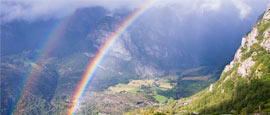A Canning Museum may not seem like much fun, but the NorskHermetikkmuseum, housed in an old sardine-canning factory, is actually very interesting. A battery of old machines has survived, but the main pull is the collection of vintage sardine tin labels. On busy days and holidays, the museum smokes its own sardines and very tasty they are too.
Things to see in Stavanger
Tourist offices
Address: Strandkaien 61, Stavanger, 4005, Norway
Tel: +47 5185 9200.
Opening Hours:
Mon-Fri: 0900-1600, Sat: 0900-1400 (May and September/October only)
www.regionstavanger-ryfylke.comThere are currently no tourist passes available in Stavanger, but note that all the city’s major museums offer a joint entry policy – pay at one and you get entry into the others for free on the day of purchase. The Tourist Information office can assist with a range of services including accommodation and tour bookings.
Address: Strandkaien 61, Stavanger, 4005, Norway
Tel: +47 5185 9200.
Opening Hours:
Mon-Fri: 0900-1600, Sat: 0900-1400 (May and September/October only)
www.regionstavanger-ryfylke.comThere are currently no tourist passes available in Stavanger, but note that all the city’s major museums offer a joint entry policy – pay at one and you get entry into the others for free on the day of purchase. The Tourist Information office can assist with a range of services including accommodation and tour bookings.
Gamle Stavanger (Old Stavanger) is a part of the old city centre that was saved from destruction when most of the central areas were modernised after WWII. It consists of around 170 wooden houses and cottages from the late 18th century until the early 20th century. Guided walking tours are available; tickets are sold at the Tourist Information office, where the walks start.
Norway’s oldest cathedral is a handsome structure with a pair of slender towers poking high into the sky. Dating from 1125, the bulk of the church is a fine example of the Romanesque style with its heavy arches and dog-tooth decoration, but it also boasts a Gothic choir. This was built by English stone masons, who were brought here to work on the church in the 13th century.
This museum specialises in the maritime history of the southwest coast of Norway. It has a wide variety of objects, documents and photos that give visitors an insight into the history of shipping, ship-building and coastal culture in general. The museum also possesses two beautiful sailing ships and several smaller boats.
This art museum is located about 20 minutes’ walk west of the centre in leafy Mosvann Park by the Mosvann Lake. It houses Norway's largest collection of works by the painter Lars Hertervig (1830-1902), along with works by Edvard Munch, Christian Krogh, Harriet Backer and other notable Norwegian artists from the last two centuries. The museum is also known for its ambitious programme of temporary exhibitions.
British sculptor Antony Gormley has no less than 23 of his trademark life-size sculptures in and around the centre of Stavanger and together these distinctive cast-iron figures constitute ‘The Broken Column’. They aim to illustrate the various facets of the city and stand in a diversity of surroundings.
Opened at its present location in the main Stavanger Museum in 2011, this is a small museum focussing on the culture and history of childhood. It features a large collection of antique toys, and stages regular temporary exhibitions on a variety of themes. Ideal for family visits.
The oil industry has played a vital part in making Norway one of the world's richest countries. This museum tells the story of the industry and explains how oil and gas were originally formed and how they are extracted, refined and used. A 3D film is shown in the cinema, and visitors can take part in a virtual trip out to the oil platforms in the North Sea.
It was at Hafrsfjord in AD 872 that Harald Hårfagre (Harold Fair Hair) fought and won the battle that would result in the eventual unification of Norway. The Three Swords Monument (Sverd I Fjell) was erected to commemorate Harald’s victory and it consists of three huge, Viking-style swords rammed into a rocky knoll. The monument was unveiled by King Olav V in 1983 and is located by the Hafrsfjord, 6km (4 miles) from the centre of Stavanger.
One of the best preserved medieval monasteries in Norway, the assorted stone remains of Utstein Kloster are located about 30 minutes’ drive north of Stavanger, off the main road north to Bergen. It’s a lovely peaceful spot, with gorgeous gardens, and the museum provides an enjoyable insight into the lives of the monks who once lived here.
Do you have any Feedback about this page?
© 2026 Columbus Travel Media Ltd. All rights reserved. No part of this site may be reproduced without our written permission, click here for information on Columbus Content Solutions.








 You know where
You know where